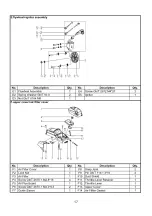
3
KICKBACK
WARNING
: Kickback is the
backward, upward or sudden
movement of the guide bar that
occurs when the guide bar contacts
an object or when the wood closes in
and pinches the saw in the cut. The
saw contacting a foreign object in the
wood can also result in a loss of
control.
Rotational kickback
occurs when
the moving chain contacts an object
with the upper tip of the guide bar.
This can cause the chain to dig into
the object, which then stops the
chain for a moment. The result is a
reverse reaction, which kicks the
guide bar up and back towards the
operator.
Pinch kickback
occurs when the
woods closes in on the moving chain
along the top of the guide bar. The
sudden stop of the chain results in
the saw to move in the opposite
direction of the rotation and the saw
is driven straight back towards the
operator.
Pull in
occurs when the moving
chain comes in contact with a foreign
object in the wood along the bottom
of the guide bar. This sudden stop
pulls the saw forward and away from
the operator and could possibly
cause the operator to lose control of
the saw.
Avoiding Kickback
Be aware of situations or objects that
can cause the material to pinch the
top of or stop the chain.
Do not cut more than one log at a
time.
Do not twist the saw when the bar is
withdrawn from an undercut.
Always begin cutting with the engine
at full speed and with the saw
housing resting against the wood.
Use wedges made of plastic or wood
to hold the cut open. Never use
metal.
Stay alert. Realize kickback can
occur and keep the cutting area free
from foreign objects.
Keep your chain properly tensioned
and sharp, along with properly
maintaining the chainsaw. Failure to
do so can increase the chance of
kickback occurring.
Begin and continue the cut with the
engine running at full speed. Use
caution while re-entering a previous
cut. Do not attempt a plunge cut
(starting a cut with the tip of the
blade).
Maintaining Control of the
Chainsaw
Stand to the left of the saw. Keep
your elbow locked and a firm grip on
the saw.
Keep the thumb on the underside of
the handlebar. Never reverse hand
positions (left hand on handlebar
and right hand on the rear handle).
Stand slightly to the left side of the
saw to keep your body from being in
a straight line with the saw. Stand
with your weight evenly balanced
between both feet.
Do not overreach because you could
be thrown off balance and lose
control of the saw. Do not cut above
shoulder height because it is difficult
to maintain proper control of the saw
at that height.
Chain Brake
The chain brake is designed to stop
the chain from rotating in the event
of a kickback.
WARNING: DO NOT RELY UPON
THE CHAIN BRAKE (OR OTHER
SAFETY FEATURES) TO
PROTECT YOU IN THE EVENT OF
A KICKBACK. Use your chainsaw
properly and under the correct
circumstances to avoid kickback.
ASSEMBLY
Wear protective gloves at all times
during assembly due to the handling
of sharp objects.
Attaching the Bumper Spike
The bumper spike may be used as a
pivot when making a cut.
1) Loosen and remove the bar knob
completely by loosening the two
nuts.
2) Remove the clutch cover.
3) Attach the bumper spike with the
two screws with the spikes pointing
downward.
Attaching the Bar and Chain
1) Make sure the saw bottom is
resting on a flat surface. Be sure the
chain brake is pulled back. (Figure1)
Loosen and remove the bar knob
completely by removing the two
nuts. (Figure 2)
Figure 1
Figure 2
Summary of Contents for 20120
Page 13: ...13 Parts List...
Page 14: ...14...
Page 15: ...15...
Page 16: ...16...
Page 17: ...17...
Page 18: ...18...
Page 19: ...19...




































